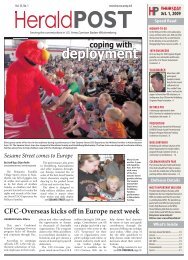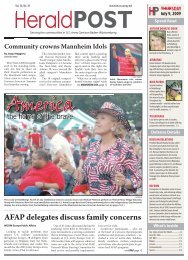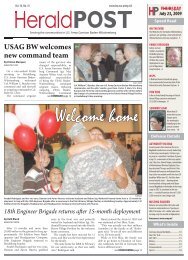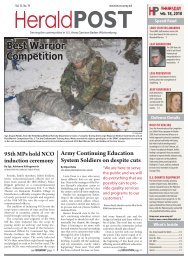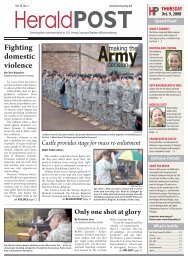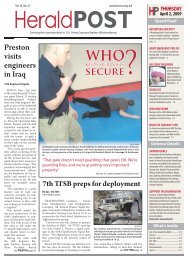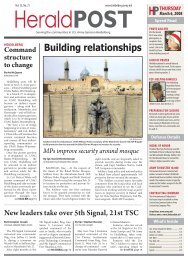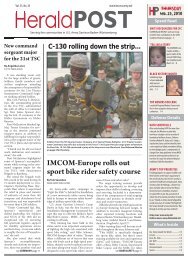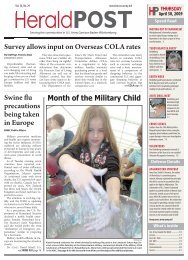Herald Post 2009-12-17.pdf
Herald Post 2009-12-17.pdf
Herald Post 2009-12-17.pdf
Create successful ePaper yourself
Turn your PDF publications into a flip-book with our unique Google optimized e-Paper software.
<strong>12</strong> NEWS<br />
Thursday, Dec. 17, <strong>2009</strong> HP<br />
Retirees can benefit from new arrangements with German government<br />
USAREUR Public Affairs<br />
Retired service members<br />
who live in Germany as ordinary<br />
residents can benefit<br />
from new arrangements with<br />
the German government regarding<br />
duties charged on<br />
purchases made in American<br />
military exchange and commissary<br />
facilities and packages<br />
received through U.S. forces<br />
post offices.<br />
The arrangements, which<br />
took effect Nov. 1, put into<br />
law benefits which previously<br />
had been agreed to but<br />
for which no law existed, said<br />
Rula Strumpen with the U.S.<br />
Army Europe Office of the<br />
Provost Marshal Host Nation<br />
Customs Policy Branch.<br />
“The concession, meaning<br />
the authorization for retired<br />
military personnel to shop<br />
at U.S. forces sales facilities<br />
– which applies also to surviving<br />
dependents, retired reservists,<br />
100 percent disabled<br />
veterans and unaccompanied<br />
dependents whose sponsor<br />
is serving in a restricted tour<br />
area – granted by the German<br />
Federal Ministry of Finance<br />
Customs Department during<br />
the past 50 years now has the<br />
force of law,” Strumpen said.<br />
“This is a great benefit. The<br />
ruling applies not only to U.S.<br />
personnel, but also to the personnel<br />
of the other Sending<br />
States Forces in Germany.”<br />
In 1964, Strumpen explained,<br />
the German FMOF<br />
Customs Department granted<br />
an exception to retired military<br />
personnel who live in<br />
Germany or who visit Germany<br />
for at least 30 days but<br />
are not covered by the Status<br />
of Forces Agreement and Supplementary<br />
Agreement for<br />
Germany.<br />
The exception allowed<br />
them and their accompanying<br />
dependents to shop in<br />
Army and Air Force Exchange<br />
Service and Defense Commissary<br />
Agency facilities. However,<br />
because of the European<br />
Community Customs Code,<br />
this ruling was always subject<br />
to revocation, she added.<br />
The new Forces Customs<br />
Ordinance codifies that privilege<br />
and allows retirees to<br />
shop for non-rationed items<br />
in AAFES and commissary<br />
facilities in Germany and pay<br />
German Customs a flat rate<br />
of duty of 17.5 percent for<br />
goods that cost less than the<br />
equivalent of €50 per item,<br />
Strumpen said.<br />
For purchases of items with<br />
a single-item sales price of the<br />
equivalent of €50 and more,<br />
German Customs will apply<br />
the 19 percent value-addedtax<br />
plus the customs tariff for<br />
the item. German Customs<br />
personnel will determine what<br />
the final rate will be.<br />
Web sites are available to<br />
help retirees determine their<br />
duty rates. A list of the tariff<br />
rates used to determine duty<br />
rates for specific items in<br />
English can be found at www.<br />
zolltarifnummern.de and in<br />
German at www.ezt-online.<br />
de. The euro rate German<br />
Customs uses to calculate the<br />
value of items is available at<br />
www.zoll.de. German Customs<br />
will use the euro rate<br />
applicable for the month the<br />
purchases were made.<br />
Retirees must still report<br />
purchases monthly to local<br />
German Customs offices and<br />
register annually with U.S.<br />
Forces Customs-Europe offices,<br />
stressed Bill Johnson, director<br />
of the USAREUR OPM<br />
Customs Executive Agency.<br />
They cannot shop unless they<br />
have been issued the so-called<br />
“pink card” by a German Customs<br />
office.<br />
Another benefit for retirees<br />
is that the German FMOF<br />
Customs Department agreed<br />
they can use the U.S. forces<br />
postal system and receive<br />
packages in Germany up to a<br />
value equivalent to €22 without<br />
paying taxes or duties,<br />
Strumpen said.<br />
She added that efforts are<br />
currently ongoing with the<br />
FMOF Customs Department<br />
to work out procedures for<br />
declaring parcels to German<br />
Customs authorities. The<br />
16-ounce Department of<br />
Defense-mandated weight restriction<br />
when using the U.S.<br />
forces postal system has not<br />
changed, Johnson added.<br />
“Our job is to facilitate procedures<br />
to support U.S. personnel,”<br />
Strumpen said.<br />
The German FMOF Customs<br />
Department has been<br />
willing to come to these arrangements<br />
because they appreciate<br />
the continuing partnership<br />
with the USAREUR<br />
Provost Marshal as the customs<br />
executive agent for the<br />
U.S. forces, she said, adding<br />
that this is also proven by the<br />
fact that Germany is the only<br />
European Union member<br />
state that grants customs benefits<br />
to U.S. retirees codified<br />
by statute.<br />
Johnson said USAREUR<br />
customs officials take part<br />
in community retiree open<br />
houses and pre-retirement<br />
briefings to help educate U.S.<br />
personnel about customs policies<br />
and procedures.<br />
He also recommended that<br />
retirees who have questions<br />
visit their local retirement<br />
services or military customs<br />
offices.<br />
Schützenschnur range<br />
a ‘hit’ for 18th MPs<br />
Lean Six Sigma<br />
By Cpl. Adrienne Killingsworth<br />
18TH MP BRIGADE PUBLIC AFFAIRS<br />
Of the many perks that<br />
come with being stationed in<br />
Germany – the traveling, the<br />
schnitzel and the beer – the<br />
one thing many Soldiers seem<br />
most eager to accomplish during<br />
their tour here is earning<br />
themselves a Schützenschnur,<br />
the German marksmanship<br />
badge.<br />
For a select group of‘Roughnecks’<br />
from the Headquarters<br />
and Headquarters Company,<br />
18th Military Police Brigade,<br />
their chance to prove themselves<br />
on a German range<br />
came Dec. 3 at German Feldjäger<br />
Battalion 251’s range in<br />
Mainz.<br />
The American MP company<br />
has maintained a strong partnership<br />
with the German battalion<br />
over the years, and the<br />
joint effort of participating<br />
in one another’s ceremonies<br />
and events has given countless<br />
Soldiers the opportunity to<br />
set their sights on the coveted<br />
badge.<br />
It is as common a sight to<br />
find German feldjägers at<br />
the brigade’s ranges trying to<br />
earn American marksmanship<br />
badges as well as it is to<br />
find Americans on a German<br />
range.<br />
The Schützenschnur is<br />
earned by qualifying on a series<br />
of German weapons at<br />
either a gold, silver or bronze<br />
level.<br />
The lowest qualification<br />
earned on any given weapon<br />
serves as the level that the<br />
badge is awarded.<br />
For a Soldier to qualify as an<br />
expert, he must qualify at the<br />
gold level on every weapon.<br />
Depending on the range<br />
that the Soldiers attend, they<br />
may fire various combinations<br />
of the G36 rifle, P8 pistol and<br />
the MG3 machine gun.<br />
The Soldiers of the Headquarters<br />
and Headquarters<br />
Company were tested on two<br />
pistol ranges and one rifle<br />
range.<br />
After a full day of firing, the<br />
Soldiers headed back to the<br />
Feldjäger Battalion’s headquarters<br />
for a barbecue put on<br />
by their hosts and a chance to<br />
socialize with their German<br />
counterparts.<br />
Sgt. Maj. Cameron Porter<br />
Lt. Col. Tom Hays, the chief of Operations Research and Systems Analysis for the 21st Theater Sustainment<br />
Command, briefs leaders of the 21st TSC and its subordinate units on Lean Six Sigma at the 21st TSC commander’s<br />
conference Dec. 4 at Fritz-Walter Stadium in Kaiserslautern. Lean Six Sigma focuses on improving<br />
repetitive processes by eliminating non-value added steps and reducing variation.



